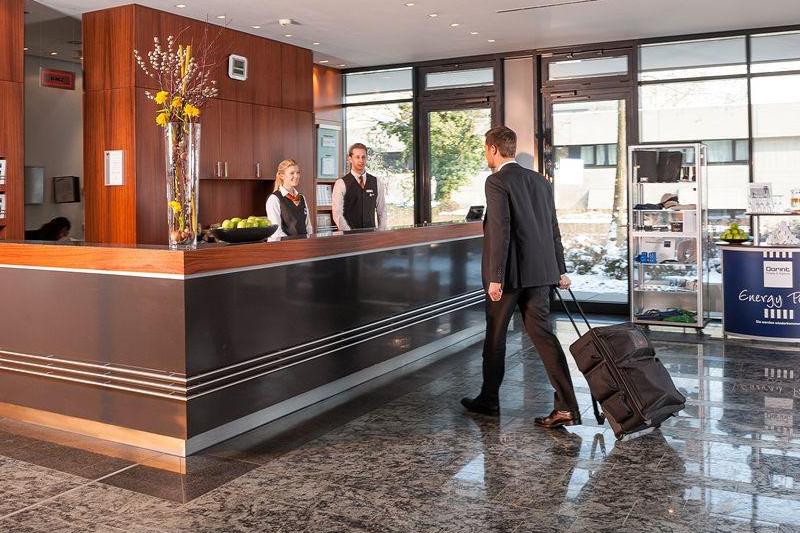Smarter hotel management in the USA: Tools and automation

The Regional Quirks of Hotel Management in the American Context
Hotel management in the United States is a field steeped in regional diversity and cultural nuances. The sprawling geography of America, from bustling urban centers like New York City to serene rural retreats in Montana, demands an adaptive approach to hospitality. In this context, hotel management is not merely about operational efficiency but also about understanding local tastes, preferences, and expectations. For instance, a boutique hotel in Austin, Texas, might emphasize live music events and Tex-Mex cuisine, while a luxury resort in Aspen, Colorado, would focus on ski packages and après-ski lounges. This regional specificity shapes the very essence of hotel management in the U.S., making it both a challenge and an opportunity.
Hotel management , leveraging automation and teamwork, drives operational excellence in hospitality.
The Human Element: Staffing as the Backbone of Hotel Management
No discussion of hotel management can sidestep the pivotal role of personnel. In the American hospitality industry, staff are often seen as the face of the establishment, embodying its ethos and values. Yet, recruiting and retaining skilled employees remains a perennial challenge. The transient nature of hospitality jobs, coupled with demanding work hours, has led to high turnover rates. To counteract this, savvy hotel managers have begun adopting innovative staffing strategies. These include offering competitive wages, providing comprehensive training programs, and fostering a workplace culture that prioritizes employee well-being.
Moreover, regional variations influence staffing decisions. In tourist-heavy areas like Orlando or Las Vegas, multilingual staff are indispensable to cater to international visitors. Conversely, in smaller towns, where community ties run deep, hiring locals can enhance the guest experience by infusing it with authentic regional charm. Effective hotel management, therefore, hinges on striking a balance between professional expertise and local knowledge.
Traditional Methods vs. Modern Innovations in Hotel Management
The evolution of hotel management techniques in the U.S. mirrors broader societal shifts. Traditional methods, such as manual check-ins and paper-based record-keeping, have largely given way to digital solutions. However, some establishments still cling to these time-tested practices, particularly in regions where technological adoption lags behind. For example, family-run bed-and-breakfasts in New England may prefer personalized service over automated systems, viewing it as a selling point rather than a limitation.
On the other hand, modern innovations have revolutionized hotel management across most sectors. Revenue management systems, for instance, allow hotels to dynamically adjust room rates based on demand, seasonality, and competitor pricing. Similarly, customer relationship management (CRM) tools enable hotels to tailor their services to individual preferences, enhancing guest satisfaction. While these advancements streamline operations, they also raise questions about the loss of personal touch—a critical concern in an industry built on human interaction.
Automation: A Double-Edged Sword in Hotel Management
Automation has become a buzzword in contemporary hotel management discourse. From self-check-in kiosks to AI-driven chatbots, technology promises to reduce labor costs and improve efficiency. Major chains like Marriott and Hilton have embraced automation to varying degrees, integrating smart room features and mobile apps into their offerings. Guests can now control lighting, temperature, and entertainment systems through their smartphones, creating a seamless and futuristic experience.
However, the rise of automation in hotel management is not without its drawbacks. Critics argue that excessive reliance on technology risks alienating guests who value human interaction. Furthermore, the initial investment required for automation can be prohibitive for smaller, independent hotels. In regions with limited tech infrastructure, such as parts of Appalachia or the Deep South, the feasibility of full-scale automation remains questionable. Thus, while automation offers undeniable benefits, its implementation must be carefully calibrated to align with regional realities and guest expectations.
Regional Idiosyncrasies and Their Impact on Hotel Management
One cannot discuss hotel management in the U.S. without acknowledging the profound influence of regional idiosyncrasies. The South, with its emphasis on Southern hospitality, places a premium on warmth and attentiveness. Here, hotel management often revolves around creating a homey atmosphere, complete with local artwork and homemade delicacies. Meanwhile, in the fast-paced Northeast, efficiency and professionalism take precedence. Hotels in cities like Boston or Philadelphia prioritize quick check-ins and streamlined services to accommodate business travelers.
The West Coast presents yet another paradigm, characterized by a laid-back vibe and eco-consciousness. California hotels, for example, frequently incorporate sustainable practices into their management strategies, from solar panels to farm-to-table dining options. Such initiatives resonate with environmentally aware guests and underscore the importance of aligning hotel management practices with regional sensibilities.
Evaluating Success: Metrics Beyond Profit Margins
In assessing the effectiveness of hotel management, financial performance is undoubtedly a key metric. Occupancy rates, average daily rates (ADR), and revenue per available room (RevPAR) provide quantifiable insights into a hotel's success. However, these numbers tell only part of the story. Guest reviews, social media mentions, and repeat visitation rates offer qualitative data that reflect the intangible aspects of hotel management—service quality, ambiance, and overall guest satisfaction.
In the U.S., online review platforms like TripAdvisor wield significant influence, shaping public perception and driving bookings. A single negative review can tarnish a hotel's reputation, underscoring the need for meticulous attention to detail in every facet of management. Moreover, regional differences come into play here as well. A glowing review for a rustic lodge in Alaska might highlight its remoteness and wilderness appeal, whereas a luxury hotel in Miami would be praised for its chic design and vibrant nightlife.
Conclusionary Reflections: Balancing Tradition and Innovation
Hotel management in the United States is a dynamic interplay of tradition and innovation, shaped by regional diversity and evolving guest expectations. Whether through the thoughtful deployment of technology, the cultivation of a dedicated workforce, or the preservation of local charm, successful hotel management requires a nuanced understanding of its multifaceted environment. As the industry continues to evolve, those who master this delicate balance will undoubtedly thrive in the competitive landscape of American hospitality.

- Creative Multimedia
- Education & Innovation
- Business & Technology
- Sustainability & Ethics
- App & IT Development
- Community & Culture
- Thought Leadership
- Event
- AI & Robotics
- Craft
- Home
- Fitness
- Free Peck
- Gioco
- Tutorial
- Health
- Music
- Networking
- Altre informazioni
- Business
- Religion
- Shop
- Sport
- Wellbeing



